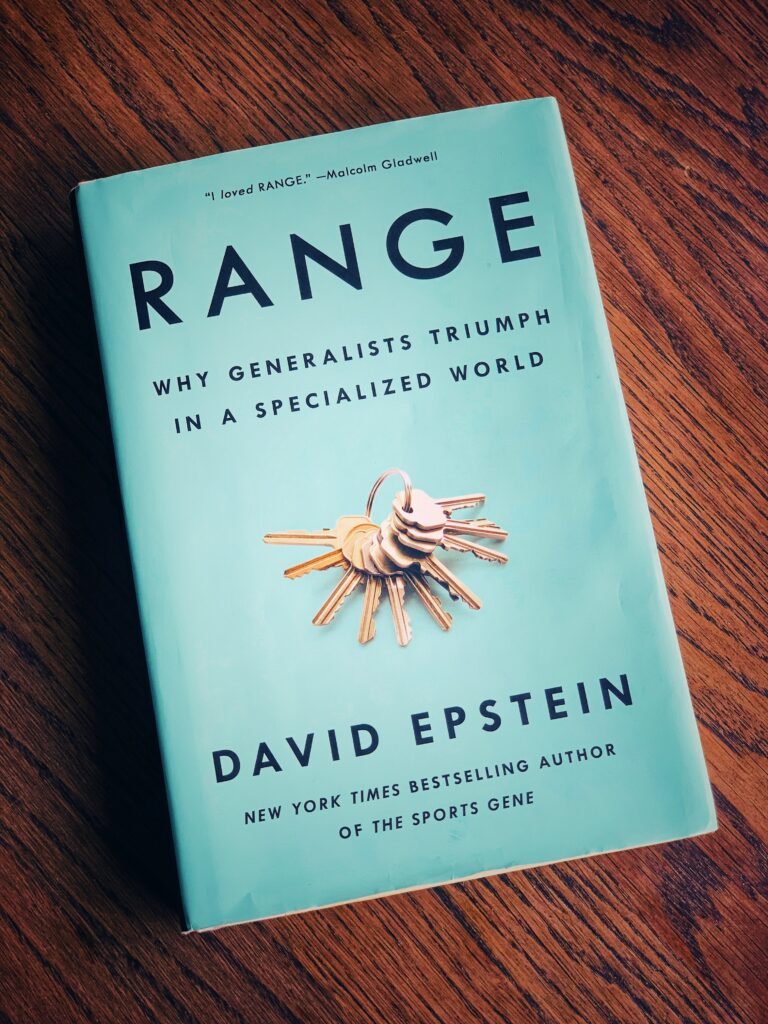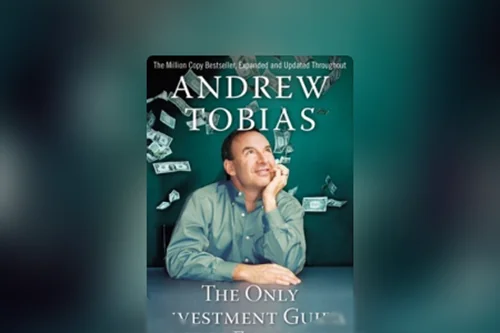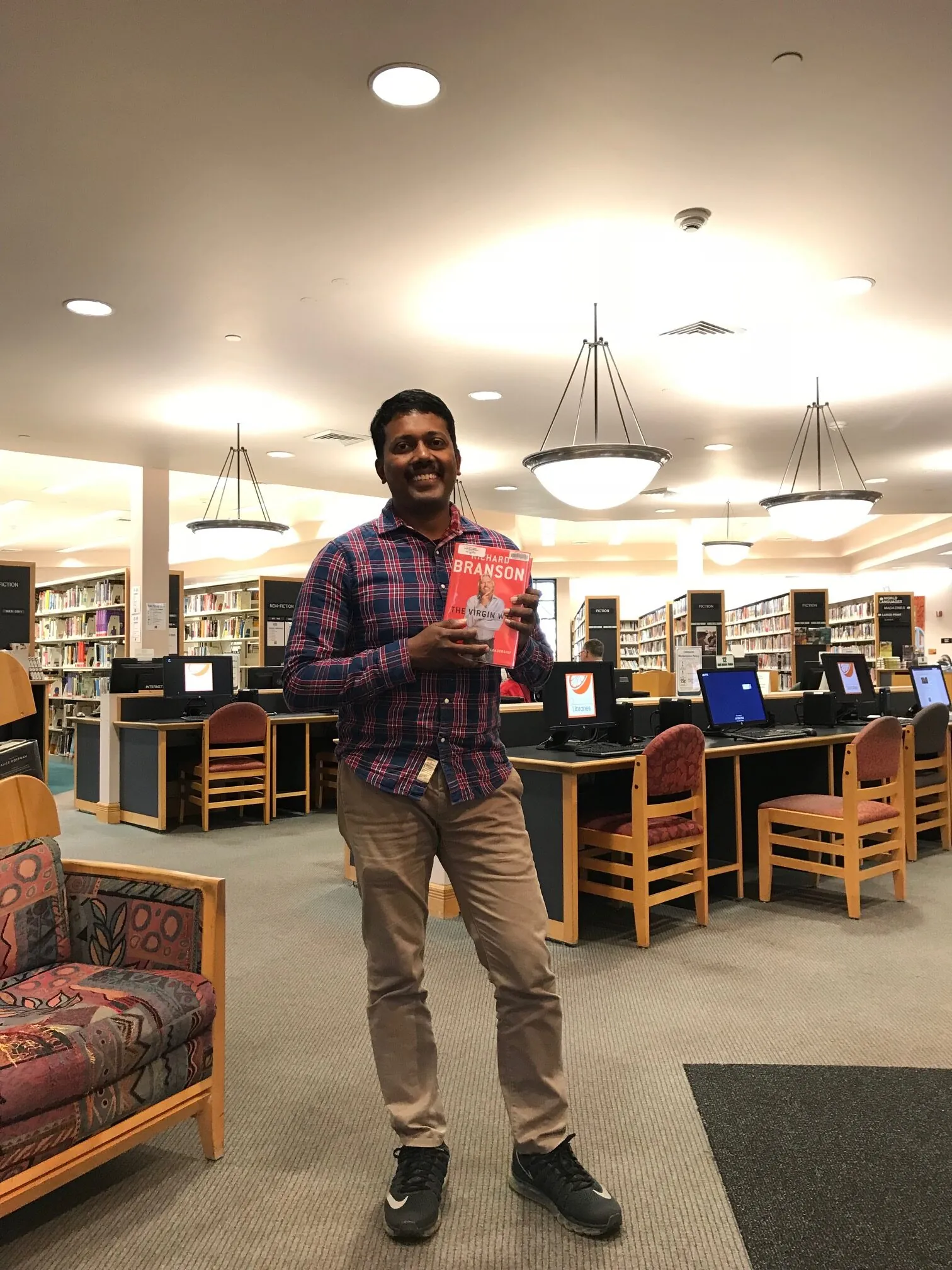Range- David Epstein
One of my friends Anand Gopalan recommended that I read David Epstein’s Range. This book was also recommended by Bill Gates on his blog. It starts with comparing Tiger Woods and Roger Federer. Tiger Woods was trained by his father to be a golfer right from his childhood (Tiger had a very early start when he was a few years old). He focussed only on golf and ended up being an all-time great. In comparison, Roger Federer’s parents did not bother too much about Roger and they let him play all the games. He tried different things, chose Tennis, and became an all-time great tennis star. He also talks about Laszlo Polgar who trained his daughters (the famous prodigy Polgar sisters) who focussed on chess right from their early childhood. David Epstein compares Tiger Woods and Polgar Sisters’ approach to AI/machine learning where a machine does well when the boundaries are well defined.
Broad Thinking
David quotes creativity researcher David Keith Simonton who observed that creative achievers tend to have a broader interest rather than obsessively focussing on a narrow topic. A self-taught English logician George Boole invented the boolean (0 or 1) in the 19th century. It was not until 70 years after Boole passed away when Claude Shannon did an internship at AT&T, where Claude used Boole’s invention to create the telephone calling routing technology. In a way, the two (Boole’s * Claude’s invention) may look unrelated. However, it did help a lot and was the key to Claude Shannon’s invention.
Broad-based thinking helps a lot and can be developed with practice. For example, how many pianos are there in New York? (You will have to take a guess taking into account the population in New York, the number of houses, and guess the number of pianos). This is also called Fermi-based thinking.

Forcing Kids to Learn
We force our kids to learn fast and look for immediate success or solutions. Parents would need to sacrifice current performance for future benefits. (example Mathematics hacks/etc). Instead of letting the students analyze the problem and take their own time to come up with solutions, we force them with tricks where they may not understand the concepts.
Learning that is both durable (it sticks) and flexible (it can be applied broadly) is important. Fast and easy is precisely the problem.
Range- David Epstein
Analogical Thinking
David Epstein refers to analogical thinking for solving problems. He recommends using analogies from different industries to compare and understand problems. Do not look just from within for your solutions. David also refers to Vincent Van Gogh, the great painter who tried different fields before becoming an artist. He died at the young age of 37. David Epstein quotes with examples that late starts do not stack against the folks. The late starts were an integral part of eventual success. David quotes Seth Godin – when he talks about quitting.
Winners Quit Fast and knowing when to quit is an essential part of success.
Seth Godin
One Thing At a Time
Frances Hesselbein was the former CEO of Girl Scouts of the USA who went on to do one thing at a time. Peter F. Drucker, the founding father of management, proclaimed Frances Hesselbein “the best CEO in America.” “She could manage any company in America, even General Motors, and do a great job,”. She set up the Frances Hesselbein Leadership Institute. She just learned by doing whatever is needed at that time. By practicing, one would have to learn by trying different things (experiments) and not by theory. Test and Learning are entrenched in the depiction of geniuses. Michael Crichton, who studied medicine, went on to write Jurassic Park. Trying different things is the answer to finding your talent.
Lateral Thinking with Withered Technology
The book also talks about the Japanese Consumer Electronics company Nintendo and its employee Gunpei Yokoi (creator of Game and Watch) who pioneered Lateral Thinking with Withered Technology. Withered refers to mature thinking and Lateral thinking refers to radically new ways of using technology. It was also great to read about the corporate culture which nurtures innovation. Andrew J. Ouderkirk and Jayashree Seth have spent decades at 3M and their breadth of expertise fosters innovation and inventions. When there is high uncertainty, breadth of expertise helps, and in low certainty areas, being niche helps.
Outside Advantage
The outside advantage helps in winning. Most clever solutions come from a piece of knowledge that was not part of the curriculum. The domain expertise for winning competitions is not that important. The Stanford biologist Paul Ehrlich’s bestseller – The Population Bomb, predicted that there will be an apocalypse from overpopulation. If you are too much of an insider it is difficult to get a good perspective and good forecasters are genuinely curious about everything.
Data & NASA
When we look at data to make decisions, one question is whether we are looking at the right data? Instead of having a narrow set of things to look at, we will end up with better results if we broaden our thinking and data set. Do not rely on what’s in front of you. Look at the bigger picture. Allegiance to hierarchy and procedure was one of the reasons for space shuttle Columbia’s disintegration in 2003. Disagreeing with the boss’s decision is important. In 2017, Rex Gevden from Nasa became CEO of BWX technologies. A company that could power manned mars missions. He said that he was going to communicate at all levels of the organization and you can’t be suspicious or paranoid about that.
Deliberate Amateurs
Oliver Smithies, a Noble prize winner, wrote his most important paper when he was 60. It is important not to end up as a clone of your thesis advisor. Oliver used to carry out Saturday morning experiments where he could try out anything he likes. The future of technology depends on a broad range of skills and a broad range of experiments. Integration of expertise is important.
Closing Note
If you are looking for sky-high results, you need to tolerate a lot of lows. If you do not start early, do not worry. Feeling behind does not help. It is important not to compare yourself to younger people who may be high achievers and who are not you. You need to compare yourself to yourself yesterday. The experience you have gained in other fields will come in handy someday and will also help with analogical thinking. Life is an experiment. One should carry out Friday night or Saturday morning experiments. Try something new every week.
Few things I learned from reading this book: Experiment and try different things. Find out the ones that work, discover your talent, and focus. Learn what is needed for doing the work at that time. Using analogical thinking will be very helpful to solve problems.




Leave a Reply